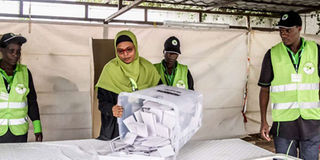Why UN is reluctant to speak up on illegalities in Kenyan poll

Presiding officer Mrs Nuzhat Mwinzaghu (second left) tallying votes with her colleagues from the Kenya Diaspora polling station at the Kenyan High Commission in Kigali-Rwanda on August 8, 2017. PHOTO | CYRIL NDEGEYA
What you need to know:
- The UN’s unwillingness to comment on the elections suggests that Kenya’s relationship with the UN has improved considerably.
- As the host for the only global UN headquarters in a developing country, Kenya is critically important to the UN.
- The UN Development Programme in Kenya bankrolled the 2017 Kenyan elections to the tune of $24 million (Sh2.4 billion).
- The UN cannot claim to be the protector of press freedom while its own officials are engaged in activities that undermine this very freedom.
Matthew Russell Lee is a journalist who produces Inner City Press, an online publication that focuses almost exclusively on the United Nations.
Maybe because of his direct and abrasive style, or perhaps because he asks questions that other UN correspondents are too meek or reluctant to ask, Lee has on several occasions been denied access to the UN Secretariat in New York’s Press Briefing Room, and quite often, his questions to UN spokespeople are ignored.
Last week, after the Supreme Court nullified the Kenyan election, Lee asked the UN spokesperson Stephane Dujarric some uncomfortable questions about the UN’s position regarding individuals involved in the electoral process.
He wanted to know why the UN in Kenya had a rather muted reaction to the torture and murder of Chris Msando, the Independent Electoral and Boundaries Commission’s ICT manager.
(After Msando’s death, the UN Office in Nairobi had stated that it hoped that the murder would not “interfere with the planning of the elections”.)
ROSELYN AKOMBE
He also wanted to know if the IEBC was aware of the fact that its commissioner Roselyn Akombe worked for the UN’s Department of Political Affairs and was a US citizen. Most of these questions, complained the journalist, were not answered adequately or were brushed aside.
The UN’s unwillingness to comment on the elections suggests that Kenya’s relationship with the UN has improved considerably since the days when Uhuru Kenyatta vilified the International Criminal Court, and by extension, the UN and Western nations, during his 2013 election campaign. What brought about this about-turn? Probably realpolitik – foes turn into friends when you need them.
The UN is not likely to upset a member state that is powerful or influential or which it relies on for its operations. The UN needs Kenya as much as Kenya needs the UN.
As the host for the only global UN headquarters in a developing country, Kenya is critically important to the UN.
FRAUDULENT ELECTIONS
Which is why the UN is often reluctant to criticise the Kenyan government or to comment on events happening here, be they assassinations or fraudulent elections.
Then there is the issue of conflicting interests. The UN Development Programme in Kenya bankrolled the 2017 Kenyan elections to the tune of $24 million (Sh2.4 billion).
The bulk of this money, donated primarily by the US, the UK and the European Union, went to the IEBC.
The UN is not likely to discredit an institution that it has financially invested in.
It is also a general rule in the aid industry that donors do not overtly criticise their aid recipients because if they do, they will be admitting that the projects they funded were not successful.
BRAVE JOURNALIST
This is also why inquisitive and brave journalists like Lee who point out the UN’s faults and weaknesses are likely to be shunned or blacklisted. Lee is not alone. The World Health Organization (WHO) has apparently blacklisted some journalists for revealing the organisation’s inept response to the recent Ebola crisis.
When reporters exposed scandals within the Food and Agricultural Organisation (FAO) and the World Intellectual Property Organization (WIPO) recently, they were threatened with legal action by these organisations.
Yet the UN claims to be the champion of freedom of expression. Last month, for example, the United Nations High Commissioner for Human Rights’ criticised US President Donald Trump for his repeated attacks on journalists.
ATTACK JOURNALISTS
Prince Zeid Ra’ad Al Hussein’s stated that the US president’s labelling of media organisations as “fake” could be interpreted as an incitement to attack journalists.
It was amazing, he said, to think that freedom of expression, a cornerstone of the US constitution, was now being undermined by a US president.
Yet, in recent months, the Office of the UN High Commissioner for Human Rights has itself been accused of suppressing information about sexual abuse of minors by peacekeepers in the Central African Republic and of revealing names of Chinese dissidents to the Chinese government.
Such actions have made a mockery of the UN’s commitment to uphold human rights and Article 19 of the UN Charter that protects everyone’s right to freedom of opinion and expression.
The UN cannot claim to be the protector of press freedom while its own officials are engaged in activities that undermine this very freedom.
Meanwhile, Lee is still awaiting a response from UN officials to his questions about the Kenyan elections.





